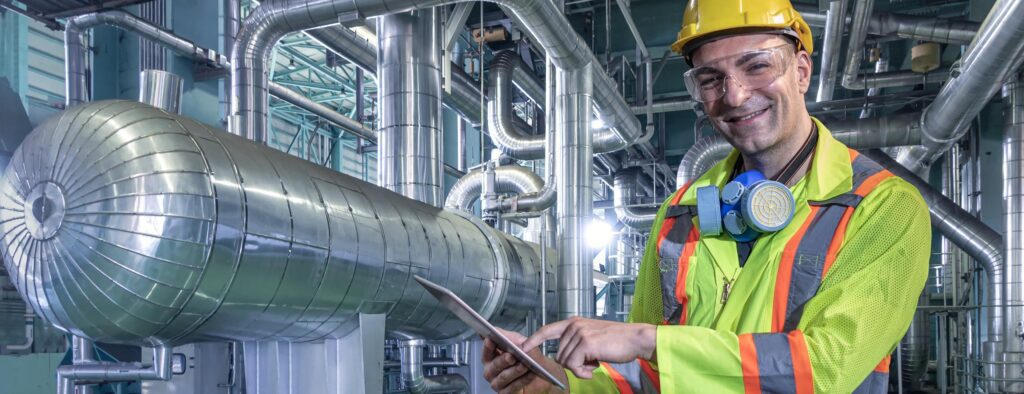
Gas turbines are not something your average person interacts with on a daily basis. But if you work in the aircraft, train, or ship manufacturing industry, you may interact with gas turbines all the time. Gas turbines are also used in the construction of electrical generators, pumps, gas compressors, and tanks. These machines are expensive, with hefty operating costs averaging around $16.00/mmBTU.
Operators know how crucial proper gas turbine air filtration is to the overall performance of your machines, and as such, your business. The good news for gas turbine operators is that they can see drastically lowered monthly costs on maintenance if their turbine system’s air flow is being properly filtered using High Efficiency (HEPA) air filters. With proper air filtration, your turbine’s compressor performance will greatly improve. A quality HEPA filter can also reduce shutdowns, optimize clean operations, and will require less frequent technical inspections.
If you are new to the world of gas turbines, you may be unaware of what they are or where they are used. Let’s break it down.
What are Gas Turbines?
A gas turbine is a combustion engine. Turbines convert natural gas or other liquid fuel into mechanical energy. This energy then drives a generator which produces electrical energy, such as the energy that moves along power lines to our homes and businesses. Gas turbines are extremely efficient machines and are the engine at the heart of the power plant that produces electric currents. Once created, this electricity is used to drive a mechanical process or to power other mechanical sources.
How Do Gas Turbines Work?
It helps to understand how these engines work, even if just at a broad level. Here are the basic steps of a gas turbine:
1. First air is compressed and then mixed with the fuel of your choice. The mixture immediately ignites and burns at an incredibly high temperature. This creates a hot gas.
2. Next, the newly created hot gas causes the turbine blades to spin rapidly.
3. The spinning blades cause the turbine’s drive shaft to turn.
4. The spinning turbine is connected to a generator rod which spins a large magnet that is surrounded by copper wire coils. The rotation of the turbine provides power to the generator.
5. The revolving generator magnet creates a powerful magnetic field, lining up the electrons around the copper coils and causing them to move. The movement of these electrons through a wire becomes electricity.
Air Filters for Gas Turbines
As mentioned above, proper air filtration is crucial to the overall performance of your gas turbine. If particulate matter enters your machinery, over time it can cause fouling, erosion, or corrosion to the internal workings. The average gas turbine will intake around 4,300 metric tons of air in a day, about 98% air and 2% fuel in total. In order to prevent your turbine from suffering unnecessary damage, you need to invest in a proper air filtration system.
Your focus should be on filters that meet the strictest requirements for burst strength and particle filtration efficiency. The correct type of filter should be used for the specific project environmental conditions and specific contaminants.
There are two main types of filtration systems for gas turbines, static filtration and pulse filtration. The pulse filter is considered a “self-cleaning” system. The major differences between the two are the environment situations your machinery faces.
If you are in an environment where the dust particles are higher than 0.300 mg/m3 or experience frequent sandstorms, you will want to use a pulse filtration system over a static system. Environmental and operational conditions can vary. Therefore, the filter solution you chose should be adapted to your local environment and business needs.
*Pro Tip: You can test your environment’s ambient air using a direct read-out device known as a laser photometer. This tool counts particulate matter in the air (by mg/m3) and will tell you which filtration system is best for your machinery.
Pulse Filters for Gas Turbines
Pulse filters are the go-to choice for dust-laden environments as well as snowy climates. Common industries that would utilize pulse filters for their gas turbines are cement plants, steel mills, and refineries. They also apply to regional areas like the Middle East or Africa where sand is abundant and dust storms are a common occurrence. These systems are successful for preventing filters from clogging due to sand, moisture, etc.
Pulse filter systems are particularly efficient because they can be cleaned when not in operation. This allows your workflow to proceed uninterrupted as your equipment is cleaned automatically in between uses.
Static Filters for Gas Turbines
Static filters are a more affordable and easier-to-maintain option if you don’t need to filter out large particulate matter like sand. Most static filter systems can be fitted with pre-filters which can easily be cleaned or replaced. They are also fairly affordable up front, but can begin to add up in cost over the long term.
Bag Filters
Bag or pocket filters are mainly used as pre/first stage filters in the gas turbine air inlet to remove coarse impurities and act as coalescers to remove smaller water droplets from the air stream. These are excellent for all types of air handling systems as the filter is constructed to withstand extreme humidity, high velocities, and turbulence.
Compact Filters
Compact or mini-pleat are high efficiency air inlet filters used for second and/or third stage filtration, depending on the gas turbine air inlet system. The box type compact filters feature a robust design, high efficiency and low pressure drop, making them a reliable and economically sound choice for turbomachinery in tough, humid conditions. Mini-pleated filters are constructed to withstand humidity, high velocities, and turbulence as found in both atmospheric air and process environments.
Cartridge Filters
Cartridge filters, both self-cleaning pulse and static, are available in vertical or horizontal designs to best suit your system. Cartridge and canister filters are used in supply air systems for gas turbines and turbo compressors both on and offshore.
Panel Filters
Panel filters are usually used as pre-filters or first stage filters in static inlet systems for gas turbines. Their main role is to remove larger particles such as pollens and other coarse impurities as well as water droplets. Graduated denier polyester fibers with an upstream layer of larger fibers followed by denser, finer fibers for greater loading, dust holding capacity offer longer life.
Contact us for more information on gas turbine air filters.

Advanced Filtration Concepts is a
Certified Veteran-Owned Small Business.
